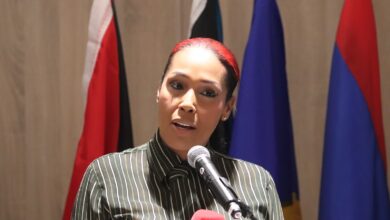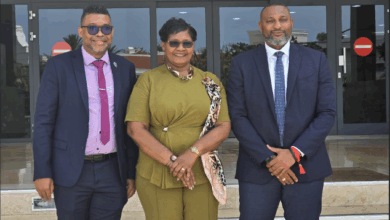Salutations:
First of all, I would like to thank the President of the Republic of Suriname, H.E Runaldo Venetiaan who holds lead responsibility for Culture, Youth, Gender and Sport within the CARICOM Community, not only for his presence at this function this evening, but also for the continuing interest that he has shown and the leadership he has given in matters related to the strengthening of the Community and in this case the well-being of the youth in Suriname and the Region as a whole.
The occasion of the launch of the CARICOM Commission on Youth Development signals, for those who may still harbour doubts, that young people are a valued and equal partner in regional development and integration processes; that they are not only beneficiaries, but active participants in the development of the region.
Former Secretary-General of the United Nations, Kofi Anan is quoted as saying: “No one is born a good citizen; no nation is born a democracy. Rather, both are processes that continue to evolve over a lifetime. Young people must be included from birth. A society that cuts itself off from its youth severs its lifeline; it is condemned to bleed to death.”
This sentiment is recognised by the Caribbean Community which is firmly committed to greater participation for young people. Over the past decade, the Community’s policy-makers and planners at all levels, in particular our Heads of Government, have identified young people as a resource for development, and have pledged to provide spaces and opportunities for capacity building, growth and development, as well as resources for effective participation in the life of the Community.
Unfortunately, the promise has not always been matched by actual delivery of the resources necessary to make youth participation more meaningful. While it is invidious to make comparisons, Suriname, Mr President, provides an outstanding example of the institutional and functional networks that can be provided to achieve a sustainable national youth movement of which the CARICOM Youth Ambassadors programme is a part.
More work is obviously required to create a supportive environment for effective youth participation in development and integration processes, and for the establishment of firm linkages in the child-youth-adult continuum, in the context of what is now called the life cycle approach. The Community’s collaborative youth agenda promotes this view and places emphasis on factors such as evidence-based approaches; strategic alliances; youth-adult partnerships and networking arrangements at multiple levels; mentorship and role models; bridging the generation gap; and the moderation, integration and coordination of policy and legislative frameworks.
The Commission on Youth Development would no doubt have to wrestle with these critical dynamics, while at the same time not diluting the focus of its mandate.
All this is taking place at a time when the CARICOM Single Market and Economy has been identified as the Community’s flagship programme and in the context of a philosophy for promoting sustainable livelihoods among all Caribbean people. The Community’s efforts to operationalise the CSME must of necessity focus on economic and financial transformations and conditions. However, it is now clear that the CSME is also a social system, anchored in the attitudes, perceptions, beliefs, motivations and expectations of human beings; and that governments need to increase their investment in personal, social and economic development and empowerment, if the promise of the CSME is to be realised. There is no better starting point for ingraining regional values than with the youth who must be imbued with the passion, the beliefs and the creativity to grasp and contribute to the opportunities which the CSME makes available.
At the recently concluded Eighteenth Inter-Sessional Meeting of Heads of Government, for example, the decision was taken to ensure that human and social development issues be given a higher profile on the agenda of the Heads of Government’s Conference. Similarly, the Rio Group Summit recently held in Guyana (2-3 March), focused essentially on the human and social issues in development and placed particular emphasis on the role of youth in the calculus of development.
These are only two of the more recent manifestations of the emphasis placed on the importance of formulating a viable youth agenda.
The Community has for some time supported and worked assiduously with some of our key partners in promoting this view. Among them I am pleased to see Mr. Charles, Director of the Commonwealth Youth Programme and also his predecessor, Mr. Armstrong Alexis. We also recognise the role of UNICEF, UNFPA and UNDP in helping to focus on a constructive youth agenda.
When in 2000 the Council of Human and Social Development approved the proposal for the re-establishment of the CARICOM Youth Ambassadors which was approved by the Conference of Heads of Government in July 2001, it was intended to give effect to the strengthening of the regional and national networks of youth organisations. CARICOM Youth Ambassadors are expected to be representatives of their national organisations and therefore to be legitimate voices of their respective countries. Over the past 5 years, the CARICOM Youth Ambassadors Programme has made a worthwhile contribution to raising awareness and by actually increasing the presence and priorities of youth within the Council for Human and Social Development and among Heads of Government through the relentless advocacy of President Venetiaan.
Nowhere else has the vitality of the CARICOM Youth Ambassadors Programme been illustrated than in the effective manner in which they have been coordinating and implementing a collaborative Mini Grant programme for prevention of HIV and AIDS among young people in the period between 2004 and the present time, throughout the CARICOM region, ranging from Belize to Suriname. This programme was made possible by support from the PANCAP Global Fund, the World Bank, UNICEF and UNFPA at the regional level, coordinated by the Secretariat; and facilitated at the national level by agencies such as Departments of Youth affairs, National AIDS Commissions and the Red Cross. This exercise fully underscores the benefits of making resources available to youth development and empowerment programmes, of putting in place governance mechanisms, and of empowering youth to make their mark on the development process.
We anticipate that the Commission on Youth Development will provide recommendations for strengthening the CARICOM Youth Ambassadors Programme in the context of strengthening national youth organisations overall. We expect the Commission to provide recommendations that would both enhance the capabilities of youth leadership and at the same time identify ways in which to reduce the risks faced by our youth, especially the poor and underprivileged, the incapacitated and the otherwise vulnerable.
We also anticipate that the Commission, in providing its recommendations, will help in whatever way possible to strengthen the social statistical basis on which decisions rest. This aspect of formulation of social policy is now receiving attention in the areas of health education and HIV/AIDS and now we are presented with the opportunity to improve our data and statistics on youth development. Only in this way can we make meaningful policy recommendations on the actual social and economic implications of youth policies and programmes, thereby linking statistics, policy research and policy making.
Young people are now fully and effectively in the centre of the Community’s development and integration agenda. Although many young people are in school and believed to be poised to make significant contributions to an integrated and competitive labour market, the impact of complex global, regional, national and personal factors has increased levels of poverty and unemployment, which in turn are associated with adolescent and youth risk, and social and economic vulnerability.
Youth development issues and challenges include early sexual initiation associated with a high prevalence of HIV and AIDS and teen pregnancy; alienation and marginalisation; low self-esteem and deteriorating value systems; crime and gang violence; and dysfunctional families, characterised by factors such as lack of supervision, incest and physical abuse. Risky behaviours tend to persist into adulthood and would have serious social and economic consequences for the implementation of the CSME, if not arrested.
The new paradigm for the CSME places equal emphasis on economic, fiscal, personal and social factors. We therefore expect the Commission in its deliberations over the next two days to explore factors such as cyber crime, migration, human trafficking and substance abuse; decline in educational access, quality and outcomes, particularly in the context of private sector needs; the availability of lifelong learning systems; changing labour requirements and jobs; and the effectiveness of youth governance, leadership and participation mechanisms. It is also envisaged that the Commission’s recommendations will speak to mechanisms and strategies to harness and channel the creative potential of youth and channel it development and integration systems.
The CARICOM Secretariat wishes to underscore the seriousness of the task assigned to the Commission on Youth Development, and the expectations which the Heads of Government and the youth of the region have of change. I wish you fruitful deliberations and look forward to participating in your inaugural discussions over the next two days.





